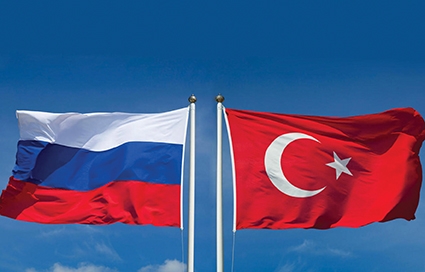Russia–Turkish Rapprochement: Implications for the South Caucasus
Op-ed
Russia - Turkish relations are going through tremendous transformations. Just two and half years ago, Turkey was a target of harsh Russian criticism, with Moscow accusing Ankara of supporting the Islamic State, assisting various other terrorist groups deployed in Syria, and oil smuggling. However, since summer 2016, bilateral relations have improved significantly. Syria is a stark example of that thaw, seeing Russia tacitly supporting the Turkish incursion into Northern Syria in summer 2016 as well as turning a blind eye to the Turkish offensive in Afrin. The bilateral economic ties are steadily growing too. On April 3, 2018, the Russian and Turkish Presidents signaled the start of the construction of the first Turkish nuclear power plant. The project is fully financed and implemented by Russia. Two lines of the “Turkish Stream” natural gas pipeline have already reached Turkish territorial waters. Both states are actively cooperating with Iran. The Russia – Turkey – Iran alliance has the potential to alter the strategic balance of power in the Middle East and put the US in defensive positions in the region for the first time since the end of the Second World War.
The growing Russian – Turkish partnership and possible creation of a trilateral Russia – Turkey – Iran strategic alliance may have far-reaching geopolitical implications in the South Caucasus. The region is squeezed between Moscow, Tehran and Ankara. All three South Caucasian republics are watching carefully the latest developments in the region, each with different expectations.
Armenia has a strategic alliance with Russia and is anchored in the sphere of Moscow’s influence. The deployment of a Russian military base in Gyumri, the establishment of a joint military unit and air defense system, Armenia’s membership in the CSTO and Eurasian Economic Union as well as approximately three million Armenians living in Russia, are the main pillars of Russian influence.
The number one national security priority for Armenia is the Nagorno Karabakh conflict, where Azerbaijan and Turkey are putting joint pressure on Armenia, effectively implementing a “war of attrition” strategy. The large-scale shipments of Russian modern weaponry to Azerbaijan in the period preceding the April 2016 ‘Four-day war” in Karabakh has shattered the perceptions of Russia as a sole guarantee of Armenia’s security. The growing Russia – Turkish relations create some anxiety in Armenia regarding the possible shifts in the Russian position regarding the Karabakh conflict. Currently, the negotiations are in deadlock. Azerbaijan rejects any possibility of Nagorno Karabakh independence, offering instead a high level of autonomy. In such circumstances, Armenia and Nagorno Karabakh are not ready to have any discussions regarding the fate of the security zone. Russia is not the only actor involved in the Karabakh conflict negotiations. The US and France, as Minsk Group co-chairs along with Russia, have their own leverage on the conflict management. However, if Russia and Turkey, in cooperation with Iran, make the decision to find a way to move the negotiation process forward, effectively ending Western involvement, this may put joint pressure both on Armenia and Azerbaijan to overcome the current impasse- resulting in changes to the status quo: unfavorable for Armenia.
Georgia continues its course towards Euro-Atlantic integration, simultaneously trying not to provoke Russia and avoid any repeat of the August 2008 scenario. Despite the fact that there are no viable chances for either EU or NATO membership in the foreseeable future, the fostering of relations with both organizations is perceived in Georgia as an efficient way towards sustainable economic development. In this context, strategic relations with Turkey are important for Tbilisi as a land border with NATO and as a tool to ensure its vital transit role for the East – West corridor, bringing Azerbaijani, Central Asian and even Chinese goods to the EU. In parallel, some circles in Georgia view Russia as a potential leverage against growing Turkish influence. In this context, the possible emergence of a Russia – Turkey alliance may complicate Georgia’s efforts, making it more vulnerable to Russian pressure and simultaneously depriving Georgia of potential leverage against Turkey.
Azerbaijan is a strategic ally of Turkey and seeks to use that alliance to balance between Russia, the West and Iran. It rejected the EU offer to sign an Association Agreement and shows little interest in joining the Russian-led Eurasian Economic Union. Meanwhile, Baku is cooperating with Russia and Iran to establish a North – South transportation corridor to connect India with Northern Europe via Iran, Azerbaijan and Russia. Just recently, the Iranian and Azerbaijani Presidents launched the Iran – Azerbaijan railway, which will play a key role in making this corridor operational. At the same time, Azerbaijan is engaged with the West to bring its oil and gas to Europe, circumventing Russia. If Russia and Turkey meet terms regarding the security architecture of the South Caucasus, it may well thwart the delicate balancing act of Azerbaijan, compelling Baku to deepen its relations with Moscow.
The rapid improvement of Russia – Turkey relations will definitely have significant implications for the South Caucasus. The region is important for Moscow as its immediate neighborhood, which it sees should be under tight Russian control to prevent potential Western encroachment. Turkey, for its part, is more focused now on Iraq and Syria where it is effectively expanding its zone of influence. Any grand bargain between Moscow and Ankara will likely strengthen Russia’s position in the region and diminish the ability of the South Caucasian republics to pursue a more balanced foreign and security policy.
Benyamin Poghosyan












